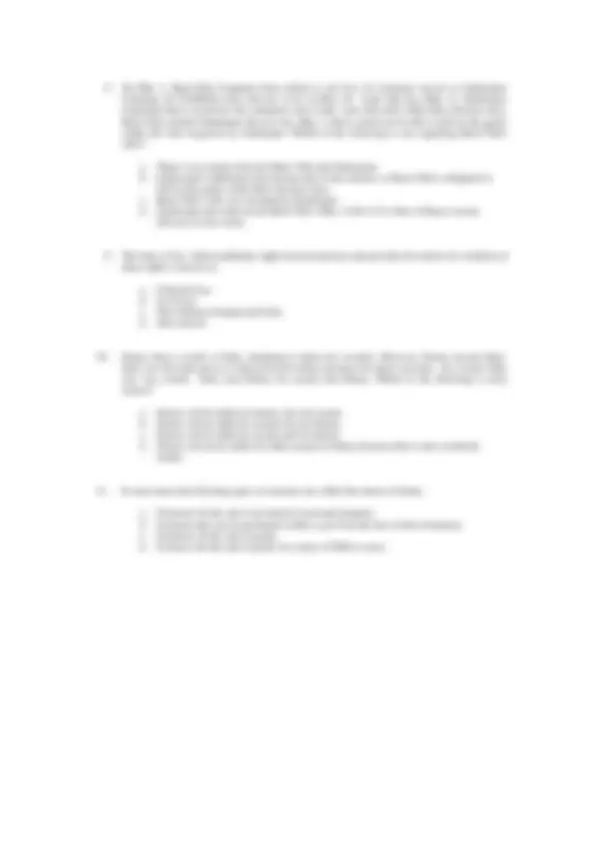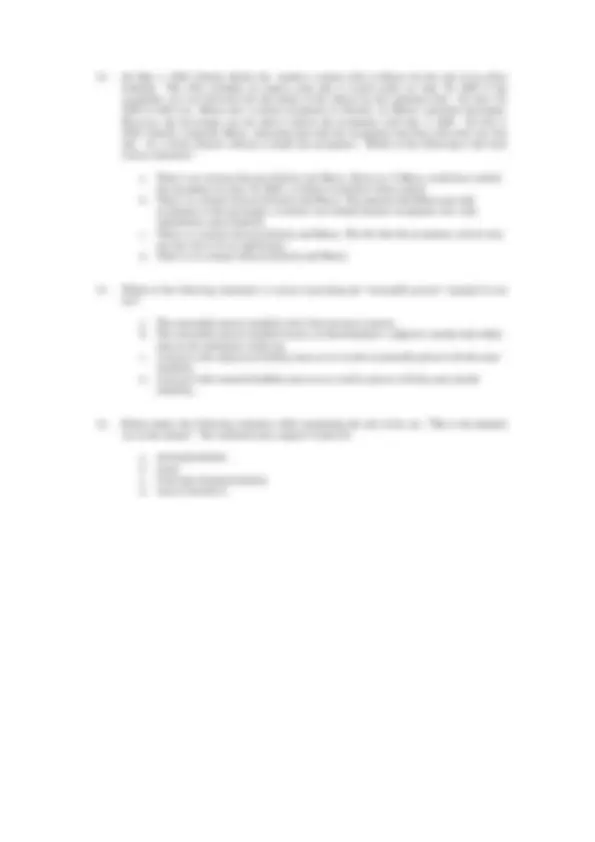





Study with the several resources on Docsity

Earn points by helping other students or get them with a premium plan


Prepare for your exams
Study with the several resources on Docsity

Earn points to download
Earn points by helping other students or get them with a premium plan
Community
Ask the community for help and clear up your study doubts
Discover the best universities in your country according to Docsity users
Free resources
Download our free guides on studying techniques, anxiety management strategies, and thesis advice from Docsity tutors
16 Multiple Choice Questions for Practice Exam with Answer Key.
Typology: Exams
1 / 6

This page cannot be seen from the preview
Don't miss anything!




MULTIPLE CHOICE (answers at bottom of page)
a. win the case, because the shopkeepers’ privilege statute gives store merchants unconditional immunity (protection) from such lawsuits. b. lose the case, because Paul did not shoplift. c. win the case, but only if a court or trier of fact concludes that Dan had reasonable cause to believe Paul may have shoplifted, detained him for a reasonable time, and in a reasonable manner. d. lose the case, because Dan did not have a warrant.
a. Bonds’ letter is not an offer unless Bonds intended it to be an offer. b. Bonds’ letter is not an offer unless McGuire thought Bonds intended to make an offer. c. Bonds’ letter is an offer if a reasonable person with full knowledge of the circumstances would be justified in thinking it was intended as an offer.. d. Bonds’ letter is not a offer unless both Bonds and McGuire considered it as an offer.
a. The letter is an offer to sell. b. A valid offer cannot be made by letter. c. The letter contains a valid offer which will terminate within a reasonable time. d. The letter lacks one of the essential elements of an offer.
a. Paul was able to prove that Don proximately caused Paul’s injuries. b. Paul was able to prove that the damages he suffered were actually caused by Don. c. Paul was able to prove that Don breached a duty of due care owed by Don to Paul. d. Paul was able to prove all of the above (a, b & c).
a. No contract was ever created between Sammy and Larry. b. A contract was created but likely not enforceable because the statute of limitations has expired. c. A contract was created, but it is only enforceable if it is in writing. d. A contract was created and is enforceable.
a. Ajax is a merchant selling Sipep. b. Ajax knew or should have known of the defective condition. c. Ajax had prior notice of other similar problems with Sipep products. d. Ajax actually placed the dead insects into the can.
a. Sale of a defective and unreasonably dangerous product. b. Manufacture of a defective and unreasonably dangerous product. c. Both (a) and (b) are correct. d. Neither (a) nor (b) are correct.
a. There is no contract between Eckerly and Masse. However, if Masse would have mailed the acceptance on June 30, 2005, a contract would have been created. b. There is a contract between Eckerly and Masse. The moment that Masse gave the acceptance to the messenger, a contract was formed because acceptances are valid immediately upon dispatch. c. There is a contract between Eckerly and Masse. The fact that the acceptance arrived only one day late is of no significance. d. There is no contract between Eckerly and Masse.
a. The reasonable person standard varies from person to person. b. The reasonable person standard focuses on the defendant’s subjective mental state rather than on the defendant’s behavior. c. A person with a physical disability must act as would a reasonable person with the same disability. d. A person with a mental disability must act as would a person with the same mental disability.
a. misrepresentation. b. fraud. c. fraud and misrepresentation. d. none of the above.
a. Paula is entitled to the balance of the lease, or $4,000, because Dave did not have a valid reason to breach the contract. b. Paula is entitled to nothing, because Dave gave Paula thirty-days written notice. c. Paula is entitled to $1,000, because she tried to find another tenant immediately upon learning of Dave’s intent to breach the contract, but was unable to re-lease the apartment until July 1 st. d. Paula is entitled to $500, which represents one-month’s rent.
a. quasi contract. b. void contract. c. voidable contract. d. secondary party beneficiary contract.
Revised: 01/